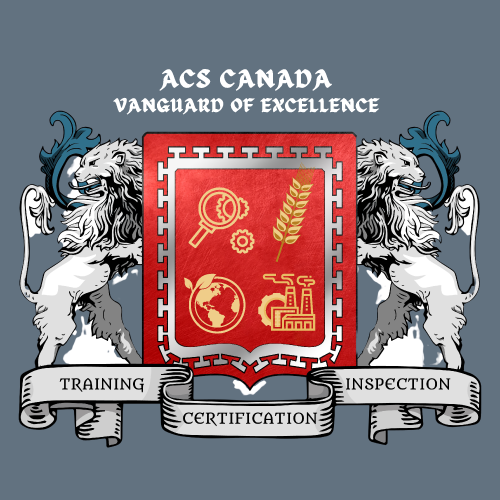ISO 22000 CERTIFICATION

FOOD SAFETY MANAGEMENT
Receiving ISO 22000 certificate from ACS, offers several significant benefits for organizations. Here are some key advantages:
1. Compliance with Food Safety Requirements: ISO 22000 is a widely recognized standard that sets out the requirements for an effective food safety management system (FSMS). By obtaining an accredited ISO 22000 certificate from ACS, your organization demonstrates its commitment to ensuring the safety of food products throughout the supply chain. This certification serves as tangible evidence of your organization's dedication to preventing foodborne hazards and maintaining the highest standards of food safety.
2. Enhanced Food Safety Practices: Implementing ISO 22000 and achieving certification through ACS encourages organizations to improve their food safety practices. The standard provides a systematic framework for identifying, managing, and mitigating food safety risks. By working with ACS, you gain access to expertise and guidance to develop robust food safety management systems, establish preventive measures, and foster a culture of food safety. This leads to a reduction in foodborne illnesses, recalls, and customer complaints, ensuring the delivery of safe and high-quality food products.
3. Competitive Advantage: Holding ISO 22000 certificate from ACS provides a competitive edge in the marketplace. It demonstrates your organization's commitment to food safety, which is a critical consideration for customers, suppliers, and regulatory authorities. The certificate showcases your organization's ability to meet stringent food safety requirements, differentiate yourself from competitors, and gain the trust of consumers. It opens doors to new business opportunities and partnerships.
4. Stakeholder Trust and Confidence: ISO 22000 certification from ACS enhances stakeholder trust and confidence in your organization's food safety performance. It provides assurance that your organization has implemented effective food safety management practices, including hazard analysis, risk assessment, and control measures. This instills trust among customers, shareholders, regulatory authorities, and the public, strengthening your reputation as a responsible and reliable provider of safe food products.
5. Risk Management: ISO 22000 emphasizes identifying and managing food safety risks. By obtaining an accredited ISO 22000 certificate from ACS, your organization demonstrates a proactive approach to risk management. This includes assessing potential hazards, implementing control measures, defining CCP's, PRP's, OPRP's and having robust traceability systems in place. Effective risk management helps prevent foodborne incidents, protect consumers, and mitigate legal and financial risks, ensuring the long-term success of your organization.
6. Continuous Improvement: ISO 22000 promotes a culture of continuous improvement in food safety performance. ACS signifies their expertise in guiding organizations through the certification process and helping them develop effective food safety management systems. By working with ACS, you gain access to ongoing support, audits, and evaluations to identify areas for improvement and drive sustainable food safety practices. This leads to a cycle of continual improvement, enhancing your food safety performance over time.
Obtaining ISO 22000 certificate from ACS demonstrates compliance with food safety requirements, enhances food safety practices, creates a competitive advantage, builds stakeholder trust, improves risk management, and fosters a culture of continuous improvement. Working with ACS as your certification body ensures that your organization receives reputable certification and gains the expertise to effectively manage food safety responsibilities while achieving sustainable business outcomes.
Training at ACS Canada
ACS employs accelerated learning methods to ensure a comprehensive grasp of all certificates. Our approach involves contextualizing your learning through a wide array of options, including classroom instruction, workshops, as well as interactive and online sessions.
ISO 22000 CERTIFICATION Training - 1
GMP Requirements

GMP – Requirements & Documentation
This course aims to teach the principles and practices of GMP requirements in the food industry.
More About This CourseISO 22000 CERTIFICATION Training - 2
LABORATORY INTERNAL AUDITOR

Laboratory Internal Auditor
This course aims to teach the principles of effective laboratory internal audits.
More About This CourseISO 22000 CERTIFICATION Training - 3
HACCP LEAD AUDITOR

HACCP – Lead Auditor
The aim of this course is to teaches the principles and practices of effective HACCP third party audits.
More About This CourseISO 22000 CERTIFICATION Training - 4
HACCP INTERNAL AUDITOR

HACCP – Internal Auditor
This course aims to teach the principles and practices of HACCP-GMP first and second-party audits.
More About This CourseISO 22000 CERTIFICATION Training - 5
HACCP REQUIREMENTS

HACCP – Requirements & Documentation
The aim of this course is to provide delegates with the knowledge and skills required to understand HACCP requirements and documentation.
More About This CourseISO 22000 CERTIFICATION Training - 6
ISO 22000 LEAD AUDITOR

ISO 22000 – Lead Auditor
This course aims to teach the principles and practices of effective food safety management system third-party audits.
More About This CourseISO 22000 CERTIFICATION Training - 7
FSMS INTERNAL AUDITOR

ISO 22000 – Internal Auditor
This course aims to teach the principles and practices of effective food safety management system internal audits.
More About This CourseISO 22000 CERTIFICATION Training - 8
FSMS ISO 22000 REQUIREMENTS

ISO 22000 – Requirements & Documentation
The aim of this course is to provide delegates with the knowledge and skills required to understand FSMS requirements and documentation.
More About This Course
